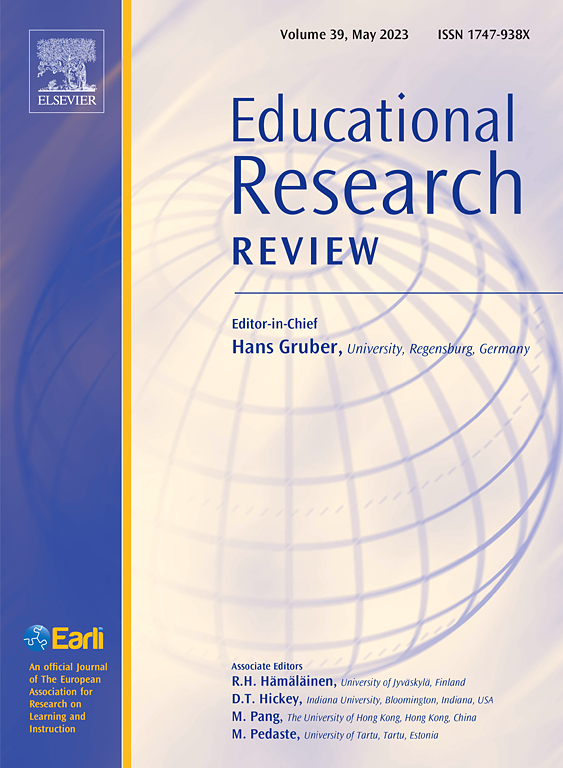The conceptualisation of goal setting and goal orientation in higher education: A systematic literature review
IF 10.6
1区 教育学
Q1 EDUCATION & EDUCATIONAL RESEARCH
引用次数: 0
Abstract
Student goals play a crucial role in both practice and theory in higher education, particularly for understanding and enhancing student motivation. However, on a conceptual level, goals are studied through separate and isolated frameworks, which complicates the ability of practitioners and researchers to combine insights from both streams of scholarship effectively. This systematic review aimed to comprehensively examine and describe the frameworks (198 studies), and conceptual distinctions and characteristics (48 studies) used in research on goal setting and goal orientation in the context of higher education since 2018. The studies selected for analysis had to discuss students’ learning process, address goal setting and goal orientation, and be published in academic journals in English. Goal-setting theory was the most frequently used for the goal-setting concept, while achievement goal theory (2 × 2 model) dominated for goal orientation. Summative content analysis revealed that goal-setting frameworks primarily emphasised the concept of the goal itself, including its structure, goal commitment, implementation intentions, and the processes leading to goal achievement. In contrast, goal orientation frameworks delved deeper into the underlying motivations driving goal pursuit, exploring related attitudes, addressing specific educational objectives and strategies, emotional factors, and the detailed standards individuals set for their outcomes. Because these theories are complementary, we propose an integrated goal setting and orientation (IGSO) theory, which can help in studying and understanding how motivation for goal pursuit is connected with the setting, monitoring and evaluation of goals.
高等教育目标设定与目标导向的概念:系统的文献综述
学生目标在高等教育的实践和理论中都起着至关重要的作用,特别是在理解和增强学生动机方面。然而,在概念层面上,目标是通过单独和孤立的框架来研究的,这使得从业者和研究人员有效地结合两种学术流的见解的能力变得复杂。本系统综述旨在全面检查和描述自2018年以来高等教育背景下目标设定和目标取向研究中使用的框架(198项研究)和概念区别和特征(48项研究)。所选择的研究必须讨论学生的学习过程,涉及目标设定和目标定位,并发表在英文学术期刊上。目标设定概念最常使用目标设定理论,而目标导向主要使用成就目标理论(2×2模型)。总结性内容分析表明,目标设定框架主要强调目标本身的概念,包括其结构、目标承诺、实施意图以及导致目标实现的过程。相比之下,目标取向框架更深入地研究了驱动目标追求的潜在动机,探索了相关的态度,解决了具体的教育目标和策略,情感因素以及个人为其结果设定的详细标准。由于这些理论是互补的,我们提出了一个综合目标设定和定向(IGSO)理论,它可以帮助研究和理解目标追求动机如何与目标的设定、监测和评估相关联。
本文章由计算机程序翻译,如有差异,请以英文原文为准。
求助全文
约1分钟内获得全文
求助全文
来源期刊

Educational Research Review
EDUCATION & EDUCATIONAL RESEARCH-
CiteScore
19.40
自引率
0.90%
发文量
53
审稿时长
57 days
期刊介绍:
Educational Research Review is an international journal catering to researchers and diverse agencies keen on reviewing studies and theoretical papers in education at any level. The journal welcomes high-quality articles that address educational research problems through a review approach, encompassing thematic or methodological reviews and meta-analyses. With an inclusive scope, the journal does not limit itself to any specific age range and invites articles across various settings where learning and education take place, such as schools, corporate training, and both formal and informal educational environments.
 求助内容:
求助内容: 应助结果提醒方式:
应助结果提醒方式:


